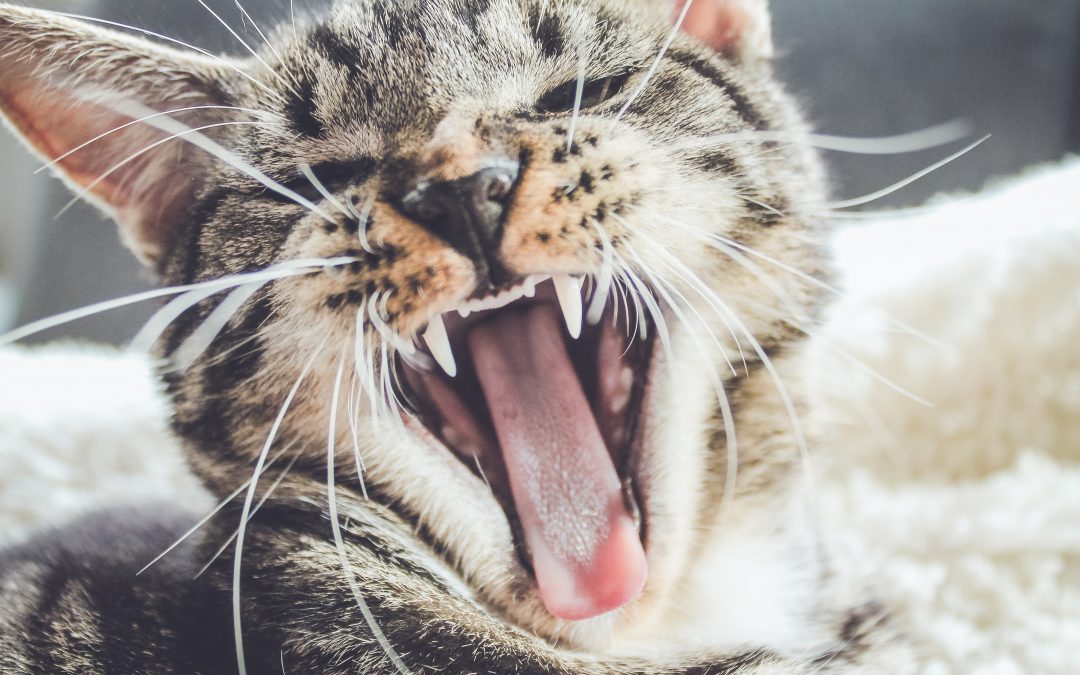
Though you may not often think of it, dental health is just important for cats as it is for people. Good dental health is an essential component of good overall feline health, so it’s important to keep your cat’s teeth in excellent condition.
Feline Dental Care at Home
There are a lot of ways that pet owners can ensure their cats maintain good dental hygiene, including brushing your cat’s teeth regularly, providing chew toys and treats designed to promote dental health, and feeding your cat healthy food and treats that won’t lead to tooth decay.
Brushing

More than 90 percent of domestic cats will have some type of dental problem in their lifetime. The best way to combat feline dental problems such as plaque, tartar, gum disease, periodontal disease, and other serious issues is by brushing your cat’s teeth regularly.
As you might expect, training your cat to accept having their teeth brushed can be a difficult task, especially if you have an older cat. If you get your cat as a kitten and you start introducing them to tooth brushing early, it will be much easier on both of you. To ease the process, here are a few tips for brushing your cat’s teeth:
- Make sure you are using a toothbrush designed for cats. It’s smaller and the bristles are softer.
- You’ll also need to use a feline toothpaste. Toothpaste meant for humans is likely to upset your cat’s stomach and make the process much more difficult.
- Don’t brush too hard. Using too much force can hurt your cat’s gums, cause distress to your cat, and make the process of brushing their teeth much more difficult in the future.
- After you’ve finished brushing your cat’s teeth, be sure to reward them with a tooth-friendly treat or playtime. This will help condition them to accept having their teeth brushed.
Treats

There are a variety of feline dental treats available commercially, and different treats can benefit your cat’s dental health in different ways. There are some hard treats that are meant to help keep your cat’s teeth strong and free from plaque. When the cat eats the treat, it helps to scrape the plaque from their teeth when they chew. Other kinds of treats support your cat’s dental health by encouraging them to produce enzymes that fight bacteria in their mouths.
There are some treats on the market that are advertised as treating bad breath in cats. These treats usually only cover up dental problems, rather than actually treating the source of the issue causing bad breath. Ongoing bad breath is usually a sign of more serious dental problems that need attention. You should avoid giving your cat treats that simply cover the problem of bad breath because you might be allowing more serious problems to go undetected.
Treat that promote good dental health can be higher in calories than regular treats, so be sure you understand how these types of treats will impact your cat’s diet and how they should be incorporated into an overall healthy lifestyle for your cat.
Toys

There are a variety of cat toys on the market meant to promote good dental health. Some of the options have catnip on the inside to encourage cats to chew on them. Others have netting on the exterior that helps to scrape away plaque and strengthen teeth and gums. Different cats have different preferences when it comes to toys, so you might need to experiment with some different options before you find the right choice for your cat.
Warning Signs of Dental Problems in Felines

Even with vigilance on your part, you may not be able to prevent all dental problems for your cat. There are several warning signs that could mean your cat has dental problems and needs to see the vet.
- Ongoing bad breath
- Excessive drooling
- Bleeding gums
- Discolored gums
- Swollen gums
- Ulcers in the mouth
- Difficulty eating
- Refusing to eat
- Chewing food on one side of the mouth
- Pawing or scratching around the mouth
- Loose, broken, or missing teeth
- Blood in saliva or nose
Cats often hide their pain to avoid showing any weakness that could be taken advantage of by a predator. That means you may not know your cat is in pain until it’s hurting badly. With regular health checkups, though, your vet may be able to spot subtle problems that aren’t otherwise obvious, allowing them to be treated before they become more serious.
Professional Feline Dental Care

As your cat ages, it may become necessary to have some professional dental work done to support your cat’s oral and overall health. Your vet may recommend a variety of common dental procedures, including professional teeth cleaning, x-rays, applying a sealant to prevent future tooth decay, or tooth extraction to remove damaged or diseased teeth. Most professional feline dental procedures are done under anesthesia to reduce the stress on your cat. Preparing your cat for anesthesia will usually require pre-operative bloodwork and screenings to ensure your cat is healthy enough for the procedure. All of these components can add up to a high cost, so be sure to discuss all the possible scenarios with your vet before any procedures.
Dental health in cats is a vital component of their overall health and wellbeing. Since problems with their teeth and gums may not be immediately noticeable, it’s important for you to have their teeth and gums checked regularly by your vet. You can also support good feline dental health at home through special treats, proper diet, and toys made for promoting dental health.


